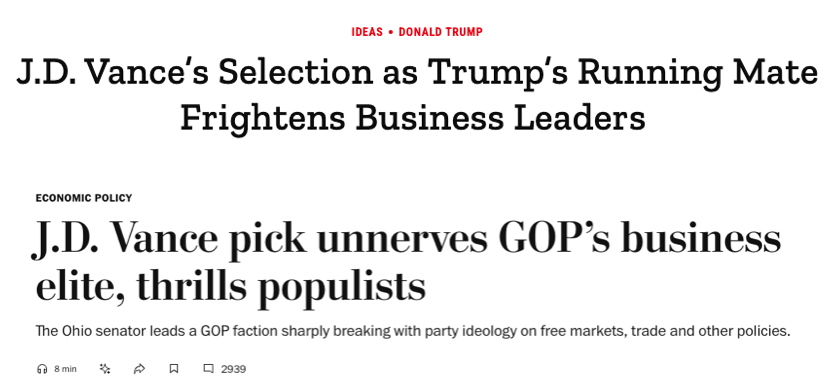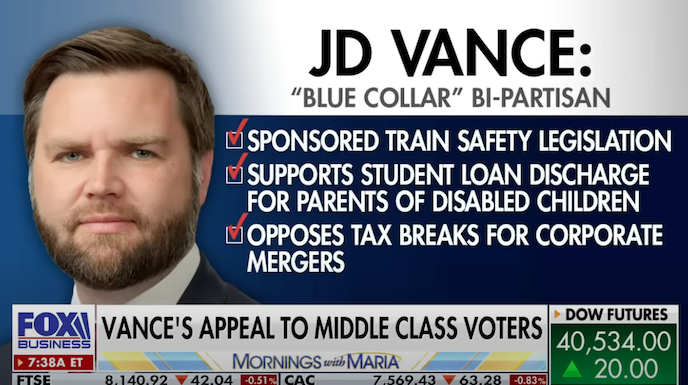Summary
- The selection of JD Vance as Donald Trump’s vice-presidential nominee signals a potential shift or reinforcement of certain economic and trade policies.
- Vance, known for his populist stances and advocacy for the working class, aligns closely with many of Trump’s economic viewpoints.
- This partnership likely suggests a future direction characterised by protectionist trade policies and a focus on reviving American manufacturing.
- It indicates a strong desire among the electorate for policies that reclaim economic sovereignty, which is also reflected by the overlap between populist right and left economic policies
In a move reaffirming our analysis of protectionism and populism, The Trump-Vance ticket suggests a continuation and possibly an intensification of populist economic policies that focus on protectionism, industrial revitalisation, and deregulation. The convergence of some of these ideas with left-leaning economic plans highlights a broader, cross-ideological concern for the welfare of American workers and the domestic economy. This alignment underscores a significant shift in the traditional economic policy landscape, pointing to a future where trade and business policies are increasingly shaped by populist sentiments across the political spectrum.

Populist Economic Plans
- Protectionist Trade Policies: Both Trump and Vance have expressed scepticism towards global free trade agreements, favouring policies that protect American industries. This includes imposing tariffs on imports to make American-made goods more competitive domestically. This stance aims to reduce the trade deficit and bring back jobs that have been outsourced to other countries.
- Industrial Revitalisation: A cornerstone of populist economic plans is the revitalisation of American industry, particularly in manufacturing sectors. This involves incentives for companies to keep production within the United States, as well as investments in infrastructure to support industrial growth. The goal is to create sustainable jobs and boost local economies, particularly in regions hit hard by deindustrialisation.
- Regulatory Reforms: Vance, like Trump, advocates for deregulation to stimulate economic growth. This includes reducing bureaucratic red tape that businesses face, thereby encouraging entrepreneurship and innovation. Such reforms are intended to make it easier for small and medium-sized enterprises to thrive.
Overlapping with Left-Leaning Policies
Interestingly, some of these populist economic policies overlap with proposals from the left. For instance:
- Economic Nationalism: While traditionally associated with right-wing politics, economic nationalism has also found resonance on the left. Figures like Bernie Sanders have criticised free trade agreements for harming American workers and have called for renegotiating trade deals to protect domestic jobs. Both sides seek to prioritise the welfare of American workers over global economic integration.
- Infrastructure Investment: Investments in infrastructure are a common ground where both populists on the right and left agree. The emphasis on rebuilding and modernising America’s infrastructure is considered a way to create jobs and improve the country’s economic foundation. This bipartisan appeal recognises the critical need for updated transportation, energy, and communication systems.
- Corporate Accountability: Both Trump-Vance populism and left-wing ideologies advocate for holding corporations accountable for their impact on American workers and communities. This includes scrutinising tax policies that benefit large corporations at the expense of smaller businesses and the working class. There is a shared belief in curbing corporate practices that contribute to income inequality and economic disparity.
Implications for the US Electorate and Society
- Discontent with Economic Inequality: The overlap between populist right and left economic policies underscores a widespread dissatisfaction with the growing economic inequality in the United States. Both sides recognise that the benefits of economic growth have not been evenly distributed, leading to a demand for policies that address this imbalance.
- Desire for Economic Sovereignty: There is a strong desire among the electorate for policies that reclaim economic sovereignty. This is evident in the bipartisan scepticism towards global free trade agreements and the push for protecting domestic industries. The focus is on ensuring that economic policies serve national interests rather than global corporate interests.
- Shift Towards Populism: The populist wave, evident in both Trump’s and Sanders’s supporters, reflects a broader shift in American politics. Voters are increasingly drawn to candidates who promise to challenge the status quo and advocate for the working class. This shift suggests a move away from traditional party lines towards a more issue-based political alignment.
- Economic Anxiety and Social Fragmentation: The overlap in economic policies also points to underlying economic anxiety and social fragmentation. Many Americans feel left behind by the rapid changes in the global economy, leading to a search for policies that promise economic security and stability. This anxiety is fuelling a populist rhetoric that finds common ground across traditional ideological divides.

Global Trends
The convergence of left and right around populist economics in the United States and Europe reflects a global trend. Populist movements across Europe advocate for protectionist trade policies, economic nationalism, and corporate accountability.
In Italy, the Five Star Movement (left-wing populist) and the League (right-wing populist) criticise the EU’s economic policies and call for national sovereignty and protection of local industries. In France, the National Rally (far-right) and La France Insoumise (far-left) both critique globalization and prioritise French workers and industries.
This trend is driven by economic discontent and a sense of disenfranchisement among the working and middle classes. Populist leaders promise to restore economic fairness and sovereignty, challenging traditional left-right divisions. This reflects a demand for economic policies that address inequality, protect jobs, and hold corporations accountable, signalling a realignment in global economic policymaking.
